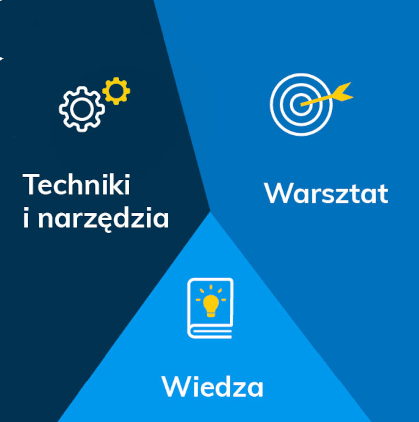Złap rabaty na szkolenia w lipcu i sierpniu. Latem mniej nawet do -290 zł netto za uczestnika Sprawdź szkolenia w promocji
Stress management - emotional intelligence training
Emotions and stress are resources that you can consciously use to support you in achieving your goals. If you feel that most of the time you are suppressing something, you are consumed by stress, shyness, or you explode with anger, we have good news for you - you can learn how to change your own style of coping with stress and how, as part of emotional intelligence, change any of your emotions, e.g. anger, sadness - for peace and contentment!
How will your life change when, instead of irritation, anger and stress, you feel satisfaction, serenity and joy? We will help you achieve this thanks to new knowledge and skills as well as 12 practical techniques that you will receive from us.
or
Effects of participating in the stress and emotion management training
We know that after training - especially in the most difficult moments - all kinds of maps, signposts, and behavior patterns are useful because they suggest the direction of thinking and action and accelerate the formation of new, constructive habits. Thanks to the 12 techniques we will equip you with:
- You will learn what your natural reaction to factors causing stress is
- You will change your strategy of thinking about your own emotions and behaviors
- You will discover and strengthen your internal resources that will help you maintain balance in the most demanding situations
- You will learn how to recognize your emotions faster and prevent frustration
- You will learn to act calmly and effectively in stressful circumstances
- You will learn to keep your emotions at a level where you feel positively motivated to act
- You will learn how to regenerate your body after emotionally exhausting events
- You will develop your optimism and the ability to influence your own sense of happiness
During our training, you will learn how to manage your own real emotions!
We know how to design and conduct training so that you get more from it! Not only the knowledge and skills you will develop with us are crucial, but above all:
- Workshop work based on your real experiences, thanks to which you will practice the newly learned techniques;
- Your deep, personal "discoveries" that guarantee that you will be internally motivated to use your new skills after the training;
- Your own, various emotions, which you will not only be able to manage immediately, but also thanks to them, you will learn more and our training will be remembered for a long time!
They have already attended our training
Regardless of what kind of marketing a training company does - the number and content of opinions and their credibility absolutely verify the quality of the training! Read the opinions of our participants about stress management and emotional intelligence training and other training - they are the best proof of what you can expect. We have plenty of them (and that says something...), signed with full names and companies.
I wholeheartedly recommend the presenter. I have never encountered such extensive knowledge and in-depth understanding of the subject before.
The Emotional Intelligence training showed me practical tools to work on myself and my skills. I will be happy to share the knowledge I have acquired, not only at work, but above all in my personal life. I had great hope that I would be able to skillfully control and manage my emotions.
We conducted training for:
Who is the training of Stress and emotion management - Emotional intelligence for?
We especially recommend strengthening emotional intelligence to employees who :
- manage a team/processes - the pressure of operating at the intersection of two points of view and expectations (management - team) often gives rise to difficult emotions, e.g. anger, helplessness, frustration
- have contact with clients or contractors - dealing with emotions, frustrations and expectations of clients/contractors, with emphasis on taking care of the company's image and controlling their own emotions and reactions
- their position requires making numerous key decisions - people in management positions associated with great responsibility
- they work creatively; their work is subject to constant evaluation or the effects of actions are visible later - uncertainty of the results of actions taken and meeting the expectations of others may lead to frustration and burnout
- perform repetitive, monotonous tasks - daily routine can lead to frustration and burnout
- they easily become angry, irritated, or sad in the workplace - which may reduce job satisfaction among co-workers
- they perform risky work - the awareness of great responsibility can sometimes be paralyzing and cause severe stress
Arguments for the boss
Why does business value emotion and stress management?
Emotional intelligence is the ability to manage emotions and stress to effectively achieve business goals. Contrary to popular belief, this is not an innate feature - it can be acquired at any time!
![]() A company that invests in stress and emotion management skills among its employees achieves an advantage of effectiveness and efficiency because our mind has limited operating space - when it is filled with difficult emotions, there is no room for analysis, drawing conclusions and making the best decisions for the company.
A company that invests in stress and emotion management skills among its employees achieves an advantage of effectiveness and efficiency because our mind has limited operating space - when it is filled with difficult emotions, there is no room for analysis, drawing conclusions and making the best decisions for the company.
An employee under stress and difficult emotions:
- loses sight of business goals and strategic activities for the company while trying to cope with the situation
- may run away from problems and responsibility, depriving superiors of the opportunity to secure further risks for the company
- is less likely to make bold decisions and actions that can bring great benefits to the company
- may react with anger/aggression/apathy in tense situations, affecting team morale and commitment
- has difficulty performing assigned tasks on time and/or acts conservatively, not fully using its operational potential
- may react emotionally to the feedback received, making it difficult to develop a constructive solution
- may avoid contact, experience job dissatisfaction, frustration or burnout
- is sick more often and is more willing to resign from a given position or company
An employee with developed emotional intelligence:
- strives to achieve strategic goals for the company, managing to take necessary risks and proactively approaching difficulties
- takes responsibility for the tasks entrusted to him and his team because he looks for solutions and treats problems as challenges
- can cope with difficult emotions in stressful situations (e.g. during a presentation, conversation with a difficult client, commercial negotiations)
- maintains more peace and freedom in relationships with clients/contractors and colleagues - even in the "hottest" moments, he can think and act rationally
- is an important link that brings the team together - he is able to respond empathetically to the emotions of others, without taking them on himself
- communicates his emotions and needs in an open and constructive way, making his behavior clear to those around him and cooperation with him more effective
- in new or difficult situations, looks for benefits and positives instead of focusing only on problems and risks - can be a good ambassador of changes in the organization
- it is more effective and therefore more reliable in operation
- through his composure, attitude towards finding solutions and optimism, he builds a positive image of the company he works for
Everything your boss needs to decide on your enrollment. Present the package of benefits for the company resulting from your participation, and we will meet at a training session soon! :)
Read the program or check other training options
Two-day training program:
Stress and emotion management - Emotional intelligence
1. How to develop emotional intelligence and use it in practice? – understand emotions and learn to recognize them:
- How do emotions arise? - the process of creating emotions is the key to conscious management of them.
- Recognizing emotions – how to listen to the signals sent by the body (physiology of emotions) and properly name emerging emotions?
- What is the importance of naming emotions for the process of regulating emotions?
- What obstacles stand in the way of effectively dealing with emotions - learn about the most important defense mechanisms .
2. Emotion management - how to deal with anger, frustration, sadness, fear and other difficult emotions?
- What are the positive aspects of anger and other difficult emotions (yes, yes, positive!)?
- How to use the right questions to reach the source of emotions and find a constructive solution in every difficult situation?
- Anger extinguishing algorithm - an original tool that allows you to change anger into a neutral state, enabling comfortable, normal functioning.
- How to change negative beliefs that are behind the anger, frustration, fear - belief modification training and dealing with habitual, recurring thoughts.
3. Emotional intelligence in relationships - how to talk about emotions, react to the emotions of others and build understanding in the most difficult interpersonal situations?
- What is empathy and is there a place for it in business?
- How to respond empathetically to difficult emotions of colleagues/business partners/customers and direct the conversation towards a constructive solution?
- How to discover the needs hidden behind other people's emotions - a communication model in the spirit of Marshall Rosenberg's Nonviolent Communication .
- How to express your emotions constructively – even in business!
4. Stress management - how to recognize your stressors and tame stress?
- What is stress, how it occurs and when it becomes a threat - learn about the process of stress formation .
- Sources of stress : difficult conversation, time pressure, workload, conflicts, professional challenges, etc. - what needs, beliefs, values lie behind the experience of stress in various professional situations?
- Stress manifests itself in the body and in your head - how to recognize stressors and respond appropriately to the first signals of stress?
- Effects of long-term tension and stress – what can functioning under chronic stress lead to?
- What does science say about this? – the latest research on stress and their practical applications.
5. Stress management - how to turn stress into constructive action?
- What is your style of coping with difficult situations – self-diagnosis.
- Conflict, time pressure, having great responsibility, public speaking - what to do to skillfully use all styles adequately to the situation and the goal you want to achieve.
- 6 steps of coping with stress - an original tool that will help you turn anxiety into mobilization and focus on constructive action.
- What to do to avoid transferring emotions and stress from home to work and from work to home?
6. How to build your emotional resilience - tools and techniques supporting the "fight" with stress:
- What makes some people cope better with emotions and stress than others?
- Breathing techniques – how to work with your breath to effectively regulate your own stress response.
- What is mindfulness and how to train mindfulness - learn an effective way to counteract the effects of functioning under chronic stress.
- Relaxation techniques - a way to relax after a hard day and reduce muscle tension in response to stress: Jacobson training, Schultz autogenic training .
- Neuropsychology in practice, or how to change the negative attitude of the brain and have more energy to act? – positive thinking training according to Rick Hanson.
Use the energy potential of emotions and stress - to your advantage.
Benefits - what will you get apart from training?

The trainer will ask about your needs and propose an optimal
program FREE
You can talk to a coach today about your problems and needs and make sure they are met. And they will be fulfilled, even if they go beyond the formula of emotional intelligence training, because only with us the "program" means something more than the training itself:

The trainer will take care of you during EXTRA
individual training FREE
When you want to tackle a challenge that goes beyond the training program but is related to its topic, or prepare for an important and difficult situation, practice and make sure that you optimally apply the learned techniques - you have 90 minutes one-on-one with a trainer, within a year from training. Apart from that:

The trainer supports you by phone with unlimited hours FREE
After all, after the training, we start to see more, so new questions arise. And a helping hand is useful to combine the wealth of knowledge and techniques acquired from our training with your life. Additionally:

Access to the training platform FREE
After the training, each participant receives unlimited access to the 4GROW online platform, where they can preview training materials, use exercises and tools, read the list of recommended books and use the forum.

Your training will be 100% FREE
Because we do not cancel training. For each training there is information about whether the training date is already guaranteed. Our training dates are covered by a guarantee - depending on the training topic - from 3, 2 or even 1 participant!

Group training after training FREE
Every few months, we organize 2-hour group trainings, during which you have the opportunity to further practice in front of the audience and receive feedback from the trainer and participants - thanks to this, you can further develop your skills and refresh your techniques!
See for yourself how pleasant and effective development can be!
Trainers conducting stress management training
If you have preferences regarding the trainer, please contact us and indicate your chosen trainer, and we will give you the date on which the training is conducted.

Małgorzata Jabłońska
Psychologist and business practitioner, soft skills trainer, bilingual coach and mentor certified in the USA
Certified clinical psychologist. She completed master's studies at the Faculty of Psychology of the University of Warsaw, as well as 4-year doctoral studies at the Institute of Philosophy and Sociology of the Polish Academy of Sciences as part of the Soros Foundation.
A business practitioner with 30 years of experience working in the corporate world in top managerial positions - in Poland, the region of Europe, Africa and the Middle East and in the USA. She has gained extensive experience in effective management of human teams - in multicultural environments, working on international and global projects at various stages of building corporate structures, in the departments of market research, business analyzes and the development of global innovations.
Trainer of trainers in the field of leadership and managerial skills training, team management and presentation (certificates obtained in the USA). He specializes in management and leadership, managing change in an organization, effective communication and conflict resolution, forum speeches and business presentations, as well as managerial coaching and mentoring.
Creator of original training and workshop programs, an experienced trainer and business presentation practitioner with extensive experience in introducing international training standards to the business world in Poland.
An expert in the field of innovative teaching methods - co-author of innovative solutions for teaching SGH students, also cooperating with PWSBiA in Warsaw and Collegium Verum, Postgraduate Studies.
Emotional intelligence training methodology
W naszych szkoleniach dostajesz właśnie w takich proporcjach:


Techniki i narzędzia konkretne strategie działania adekwatne do sytuacji i optymalne narzędzia (np. formularze, scenariusze rozmów, matryce, ściągi) – gotowce, które wiesz jak wykorzystać na co dzień
Warsztat dzięki ćwiczeniom grupowym, grom, pracy w parach, na gorącym krześle, prowokacjom, wdrażasz nowe techniki i narzędzia, doświadczasz omawianych mechanizmów na sobie także w zaskakujących eksperymentach
Wiedza niezbędne informacje, teorie przełamujące schematy i mity, badania i odkrycia z różnych dziedzin: psychologii, neurobiologii, coachingu, NLP
- Emotional intelligence training is conducted in workshops - participants practice the techniques and tools they learn in a very diverse way.
- Everyone receives training materials, exercises and tools (forms, cheat sheets, planners, etc.).
- After the emotional intelligence training, the participant receives access to the 4GROW training platform, where:
- all training materials are embedded and
- is a forum for written communication with the trainer and training participants on this topic, enabling asking questions and exchanging experiences.
- Online participants connect via a video-training platform with the trainer (and participants in the room, if they have registered as part of the Mix form).
Or maybe you prefer the classic, stationary form of training?
and a maximum of 10 people in the room
See for yourself our quality -
Why do participants value our emotional intelligence training?
Terminy szkoleń
| TERMINY | WARIANT SZKOLENIA | LOKALIZACJA | |||
|---|---|---|---|---|---|
| 2025-07-24 - 2025-07-25 |
|
Warszawa
|
Zarezerwuj | ||
| 2025-09-08 - 2025-09-09 |
|
Warszawa
|
Zarezerwuj | ||
| Do uzgodnienia |
|
Mix: Online lub dowolne miasto | Zapytaj | ||
| 2025-10-15 - 2025-10-16 |
|
Warszawa
|
Zarezerwuj | ||
| 2025-11-17 - 2025-11-18 |
|
Warszawa
|
Zarezerwuj |
Do you want to learn new skills from the best trainers?
Emotional Intelligence training - the secret to success in business?
The benefits of developing personal and interpersonal competences, including Emotional Intelligence, are already widely noticed and valued both in personal life and (perhaps above all) in business. Training is one of the most common forms of development and improvement of these so-called "soft" skills. Most often, however, we decide to "improve" our assertiveness, self-presentation or negotiation skills, neglecting Emotional Intelligence. Why do we neglect this important area, not using the potential of training? Emotional Intelligence is extremely important to us, especially nowadays!
In today's competitive and result-oriented world, we want to achieve more, look our best, and live as comfortably as possible, which is often what training companies offer us. Stress management may seem like an unnecessary luxury. Presumably, assertiveness or negotiation training also evokes more associations with active action aimed at achieving a goal than, for example, Emotional Intelligence... One reason for selective development may be the focus on the result, another - an incorrect perception of the competence itself in the context of training. Despite a significant increase in awareness, many people still associate managing emotions and stress with something vague and mysterious.
Emotional Intelligence is a better predictor of success than IQ or specialized knowledge! After all, contact with another person is the basis of almost all our activities, and their success is often determined by the ability to understand, conduct a conversation appropriately, and control the emotions felt. Think how often they were missing in your current relationships and business contacts, and you will find the answer to the question of why managing emotions and stress gives you a real competitive advantage. However, the development of these competencies requires a lot of commitment and overcoming one's own barriers, which is why participating in the training is a challenge for the brave.
A very important element of stress management training is working on your own beliefs. How we interpret reality and, as a result, how we react to it depends on them. During the training, you will experience that by changing your beliefs, you change the effects of the difficulties you encounter. Personal explanations ("It's my fault..."), constant explanations ("it always happens like this...") and universal explanations ("no matter what I touch...") clip our wings. Instead, difficult situations can be a source of increased energy, but this requires more advanced emotion and stress management skills, which you can achieve during the workshops.
It is worth getting out of patterns and stereotypes of thinking and realizing your full potential. Join us. Stress management is a competence that will translate into all areas of your life. Take this challenge!
Start achieving quick results!









